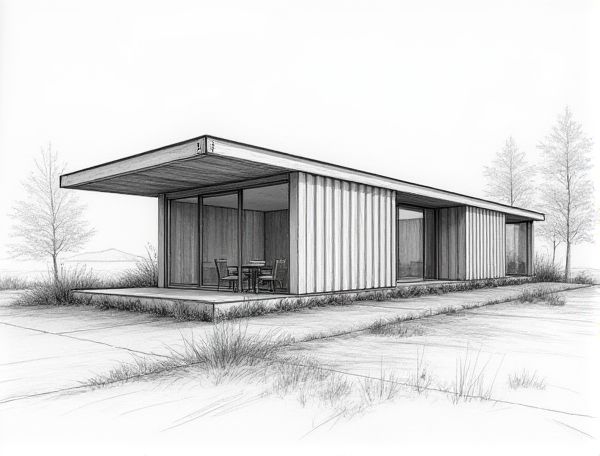
Photo illustration: Adaptive reuse home design with shipping container modules
Adaptive reuse home design with shipping container modules offers a sustainable and innovative solution to maximize space while reducing environmental impact. Discover how incorporating these versatile structures can transform your living space by reading more in the article.
Introduction to Adaptive Reuse in Home Design
Adaptive reuse in home design transforms existing structures into functional living spaces, preserving historical character while integrating modern amenities. Your project benefits from sustainable practices and unique architectural elements that reduce construction waste and enhance aesthetic value.
Benefits of Shipping Container Modules
Shipping container modules offer exceptional durability and sustainability, utilizing recycled steel structures that reduce environmental impact while ensuring long-lasting strength. Their modular design allows for rapid construction, cost efficiency, and easy scalability, making them ideal for customizable and flexible home designs.
Sustainability and Environmental Impact
Incorporating sustainable materials such as bamboo, reclaimed wood, and low-VOC paints significantly reduces your home's carbon footprint while promoting healthier indoor air quality. Designing with energy-efficient features, including solar panels, high-performance insulation, and smart thermostats, minimizes environmental impact and lowers utility costs. Prioritizing water conservation through rainwater harvesting and low-flow fixtures further enhances your home's eco-friendly profile.
Design Flexibility and Modular Configurations
Design flexibility and modular configurations empower homeowners to customize spaces that adapt to evolving needs and lifestyles. Modular design elements streamline renovations and expansions by allowing easy reconfiguration without major structural changes. Optimizing spatial functionality through flexible layouts enhances comfort, usability, and aesthetic coherence in modern home design.
Essential Considerations for Adaptive Reuse Projects
Adaptive reuse projects require careful evaluation of a building's structural integrity, historical significance, and compliance with current zoning laws to ensure safety and feasibility. Energy efficiency upgrades and sustainable materials play a crucial role in reducing environmental impact while preserving architectural character. Your design must balance modern functionality with respect for the original structure to create a harmonious and practical living space.
Cost-Effectiveness and Budget Planning
Effective cost management in home designing involves detailed budget planning that prioritizes essential elements such as materials, labor, and permits to avoid overspending. Utilizing cost-effective design strategies like modular construction and energy-efficient materials significantly reduces long-term expenses while maintaining aesthetic and functional quality.
Overcoming Structural and Insulation Challenges
Addressing structural and insulation challenges in home design ensures durability and energy efficiency, enhancing Your living comfort and reducing maintenance costs. Innovative materials like spray foam insulation and engineered wood provide superior thermal resistance and structural support in various climates. Proper integration of these solutions prevents common issues such as thermal bridging and moisture buildup, safeguarding Your home against damage and energy loss.
Case Studies: Successful Shipping Container Homes
Shipping container homes showcase innovative design and sustainable living, blending modern aesthetics with eco-friendly materials to maximize space efficiency. Case studies reveal how architects transformed modular containers into functional, stylish residences, addressing climate resilience and cost-effectiveness. Your project can draw inspiration from these examples to create a customized, durable home solution that balances creativity with practicality.
Legal, Zoning, and Building Code Requirements
Navigating legal, zoning, and building code requirements ensures home designs comply with local regulations and safety standards, preventing costly fines and construction delays. Understanding setback rules, height restrictions, and permissible land uses is crucial for securing necessary permits and avoiding zoning violations. Adhering to building codes regarding structural integrity, electrical systems, and fire safety guarantees the home's durability and occupant protection.
Future Trends in Adaptive Container Home Design
Future trends in adaptive container home design emphasize modular scalability, allowing homeowners to easily expand or modify living spaces according to evolving needs. Integration of smart home technologies and sustainable materials enhances energy efficiency and environmental impact. Advanced insulation and climate control systems improve comfort, while customizable interior layouts cater to diverse lifestyles and functions.
 homedesy.com
homedesy.com